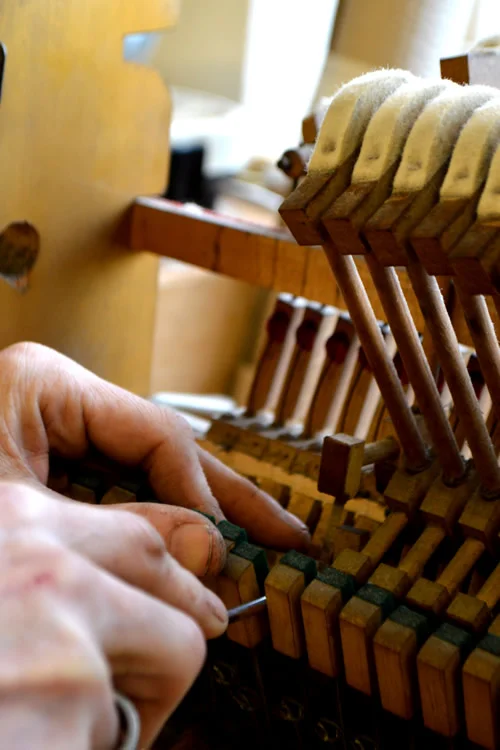Play better music! We can help improve the touch of your piano.
If your piano has sticky notes, displays a lack of response, sensitivity or has decreased dynamic ranges, it's a candidate for regulation. If you notice that the keys are not level (some higher or lower than the rest), or the touch is uneven, the need for regulation is indicated. However, a sluggish action or deep grooves in the hammers indicate the need for reconditioning or repair. Give us a call to come and appraise what is needed to improve your piano.
Regulation to a piano is the adjustment of the mechanical parts that make up the playing action of the piano. The adjustments compensate for the effects of wear and tear caused by usage, the compacting and settling of cloth, felt, and buckskin that along with wood make up the action parts. These parts are also affected by dimensional changes brought on by fluctuations in heat and humidity levels that the piano is exposed to.
The three systems involved in regulation are the playing action, pedal trapwork and damper system. The action is the mechanical part of the piano that transfers the motion of the fingers on the keys to the hammers that strike the strings. It is comprised of over 9,000 parts which require adjustment to critical tolerances to be able to respond to a pianist's every command. The pedal trapwork is the assemblage of levers, dowels and springs that connects the pedals to the action affecting sustain and dynamics. The damper system is the mechanical part of the piano that stops the vibration of the string when the key or pedal is released.
Why Pianos Need Regulating
While tuning corrects the pitch of your piano, it is only one component of a complete maintenance program. Regulation pays attention to the touch and uniform responsiveness of your action - vital to making each performance pleasurable. In addition, regulation ensures that your instrument is capable of producing a wide dynamic range - a critical control factor, particularly when playing pianissimo (quietly).
All upright and grand pianos need periodic regulation to perform their best. Frequency of regulation is dependent upon the amount of use, exposure to climatic changes, and the instrument's quality, age and condition. New pianos may require regulation in their first year because settling and compacting of parts sometimes necessitates adjustment.
Several factors can contribute to how often a piano needs regulating. The intensity and number of hours your piano is played, and climatic conditions will all contribute to this frequency. A piano kept in relatively consistent conditions which are neither too wet or dry, optimally at a temperature of 20 degrees Celsius and 42 percent relative humidity, will require less adjustment.
The quality of the piano itself also can affect frequency of regulation. Some manufacturers decrease costs by not going over the regulation and voicing processes in the factory as much as needed. Reputable retailers sometimes do the necessary piano regulation themselves prior to selling the pianos, but others do not.
Also, performance pianos may require some regulation before each use, due to the higher demands placed on them.
No amount of practice can compensate for a poorly maintained action. Poor legato touch, chord playing where all notes of the chord don't speak clearly, a gradual loss of subtlety in phrasing and an inability to execute quick passages or note repetitions evenly may be the fault of the piano!
Play better - call us today to discuss how we can improve the touch of your piano. Get your piano regulated today. We cover the whole Stoke-on-Trent area including, Congleton, Sandbach, Crewe, Nantwich, Market Drayton, Newport, Stafford, Uttoxeter, Ashbourne.



